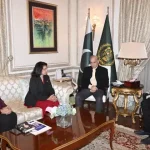ISLAMABAD: The chairman of the Pakistan Telecommunication Authority (PTA) informed a Senate hearing on Monday that unregistered VPNs will cease operations following the Nov. 30 registration deadline.
Retired Major Gen. Hafeezur Rehman distinguished between commercial VPNs used by corporations and non-commercial ones that allow users to access prohibited content in his briefing before the Senate Standing Committee on IT and Telecom.
According to Mr. Rehman, only commercial VPNs were being registered by the telecom authority.
The members of the committee asked if the PTA was legally able to ban non-commercial VPNs.
A Senate panel is looking for a legal opinion on the regulator’s power to prevent people from using VPNs.
The PTA chairman stated that people “should not access unauthorised social media apps or websites through VPNs” in response to a question regarding the status of non-commercial VPNs after November 30.
The MPs referred the question to the law ministry for feedback, raising doubts about PTA’s authority to disable non-commercial users’ VPNs.
The legitimacy of the Interior Ministry’s letter to PTA to restrict VPNs was questioned by Senator Afnanullah. According to him, social networking apps do not have VPNs.
The attorney general has been asked by the committee to provide clarification on the state of VPNs.
According to Senator Afnanullah, the Prevention of Electronic Crimes Act of 2016 forbids blocking VPNs in any situation.
Senator Palwasha Khan presided over the meeting, which covered the causes of nationwide internet outages.
The PTA chairman proposed that the secretary of the interior be invited to an in-camera briefing with Senator Khan about the VPN problem.
Approximately 2.5 million freelancers in Pakistan put their professional futures at risk due to frequent internet outages, the lawmaker claimed.
Additionally, Senator Afnanullah criticized the IT ministry and PTA for internet interruptions that “stressed” people and caused business losses.
A few committee members even questioned PTA representatives about the political motivations behind these limitations. But they denied the impression.
The statement of CII
Members of the committee also took issue with the Council of Islamic Ideology’s (CII) declaration that using a VPN is not Islamic. They stated that because they show hazardous content, the body should likewise outlaw mobile phones and TVs.
The officials refused to reply when the MPs asked for the reasoning for the CII’s ruling.
The committee members were also annoyed because Shaza Fatima Khawaja, the minister of information technology, did not attend the meeting.
It was observed that the minister had missed the Senate committee’s third consecutive meeting.
In order to draw attention to the prime minister’s “inability” to explain the choices made by her cabinet, the committee chose to write a letter to her.








